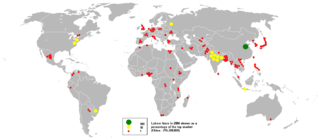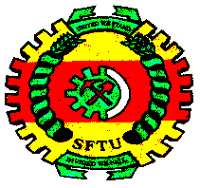
The World Federation of Trade Unions (WFTU) is an international federation of trade unions established in 1945. Founded in the immediate aftermath of World War Two, the organization built on the pre-war legacy of the International Federation of Trade Unions as a single structure for trade unions world-wide, following the World Trade Union Conference in London, United Kingdom.
In British politics, an affiliated trade union is one that is linked to the Labour Party. The party was created by the trade unions and socialist societies in 1900 as the Labour Representation Committee and the unions have retained close institutional links with it.
The ITUC Regional Organisation for Asia and Pacific is a regional organisation of the International Trade Union Confederation representing trade unions from countries in Asia and Oceania. It has 40 affiliated organisations in 28 countries, claiming a membership of 30 million people.

The National Trades Union Congress (NTUC), also known as the Singapore National Trades Union Congress (SNTUC) internationally, is the sole national trade union centre in Singapore. NTUC is at the heart of the labour movement of Singapore, comprising 59 affiliated trade unions, 5 affiliated trade associations, 10 social enterprises, 6 related organisations and other enterprise partners. It helms May Day celebrations and organises an annual rally in support of workers' solidarity and commitment to tripartite partnership. The NTUC has had a symbiotic relationship with the People's Action Party (PAP) since its inception in 1961.

Lim Boon Heng is a Singaporean former politician. A former member of the governing People's Action Party (PAP), he was a Member of Parliament (MP) between 1980 and 2011, and had served in the Cabinet between 2001 and 2011. He also served as Chairman of the People's Action Party between 2004 and 2011.

Democratic Confederation of Nepalese Trade Unions (DECONT) was a central trade union organization in Nepal. DECONT is politically tied to the Nepali Congress (Democratic). The president of DECONT was Rajendra Bahadur Raut.

The South African Agricultural Plantation and Allied Workers Union (SAAPAWU) was a trade union representing agricultural and plantation workers in South Africa.

The Confederation of South African Workers' Unions (CONSAWU) is a national trade union centre in South Africa.

The ICFTU Asia and Pacific Regional Organisation (APRO) was a regional organisation of the International Confederation of Free Trade Unions (ICFTU), representing trade unions from countries in Asia and Oceania.
The Somali Confederation of Labour was a national trade union centre in Somalia. CSL was founded in 1949. CSL was closely linked to the ruling Somali Youth League, but retained organizational independence.
The National Trades Union Congress (NTUC) spearheads the labour movement of Singapore, which represents almost a million workers in the country across more than 70 unions, affiliated associations and related organisations. Singapore runs on a tripartism model which aims to offers competitive advantages for the country by promoting economic competitiveness, harmonious government-labour-management relations and the overall progress of the nation.
The General Council of the Trades Union Congress is an elected body which is responsible for carrying out the policies agreed at the annual British Trade Union Congresses (TUC).

Nepal has a labour force of 16.8-million-workers, the 37th largest in the world as of 2017. Although agriculture makes up only about 28 per cent of Nepal's GDP, it employs more than two-thirds of the workforce. Millions of men work as unskilled labourers in foreign countries, leaving the household, agriculture, and raising of children to women alone. Most of the working-age women are employed in agricultural sector, contributions to which are usually ignored or undervalued in official statistics. Few women who are employed in the formal sectors face discrimination and significant wage gap. Almost half of all children are economically active, half of which are child labourers. Millions of people, men, women and children of both sexes, are employed as bonded labourers, in slavery-like conditions. Trade unions have played a significant role in earning better working conditions and workers' rights, both at the company level and the national government level. Worker-friendly labour laws, endorsed by the labour unions as well as business owners, provide a framework for better working conditions and secure future for the employees, but their implementation is severely lacking in practice. Among the highly educated, there is a significant brain-drain, posing a significant hurdle in fulfilling the demand for skilled workforce in the country.

The Swaziland Federation of Trade Unions (SFTU) was a national trade union center in Swaziland. It was founded in 1983 and dissolved into the Trade Union Congress of Eswatini (TUCOSWA) in 2012.
The United Labour Congress (ULC) was a national trade union federation in Nigeria.
The Trade Union Congress of Nigeria (TUCN) was a national trade union federation in Nigeria.
The Nigeria Trade Union Congress (NTUC) was a national trade union federation in Nigeria.









